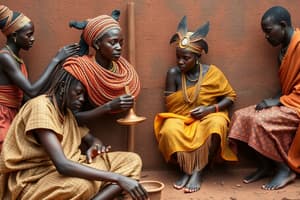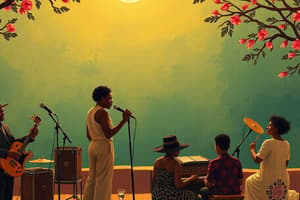Podcast
Questions and Answers
What is a key distinction between voodoo in the United States and voodoo in Haiti?
What is a key distinction between voodoo in the United States and voodoo in Haiti?
Voodoo in the United States is an organized cult, while in Haiti it is primarily a religion.
What was the primary catalyst for the emergence of the voodoo cult in Louisiana?
What was the primary catalyst for the emergence of the voodoo cult in Louisiana?
The emigration of slaves and free blacks from Saint-Domingue during the Haitian Revolution acted as the main catalyst.
How did the relationship between voodoo as a cult and its magical system evolve over time?
How did the relationship between voodoo as a cult and its magical system evolve over time?
Initially, both aspects were integral, but the cult disintegrated while the magical tradition of 'root work' persisted.
Which god was predominantly worshipped in New Orleans voodoo practices?
Which god was predominantly worshipped in New Orleans voodoo practices?
What practices were characteristic of voodoo ceremonies in Louisiana?
What practices were characteristic of voodoo ceremonies in Louisiana?
What challenges did Lucy McKim Garrison face in conveying the style of spirituals?
What challenges did Lucy McKim Garrison face in conveying the style of spirituals?
List two characteristic features of the singing style of slaves as influenced by their African heritage.
List two characteristic features of the singing style of slaves as influenced by their African heritage.
How did the spirituals adapt in terms of religious themes from African to Christian contexts?
How did the spirituals adapt in terms of religious themes from African to Christian contexts?
What did observers often label the style of the slave songs, and what does this suggest about their perceptions?
What did observers often label the style of the slave songs, and what does this suggest about their perceptions?
Explain the term 'heterophony' as used in the context of slave spirituals.
Explain the term 'heterophony' as used in the context of slave spirituals.
What other stylistic features accompanied the singing of spirituals besides vocal techniques?
What other stylistic features accompanied the singing of spirituals besides vocal techniques?
What cultural significance did the 'running spirituals' or ring shout hold in the African American religious experience?
What cultural significance did the 'running spirituals' or ring shout hold in the African American religious experience?
In addition to spirituals, what area of belief reflects the convergence of European and African traditions among black Americans?
In addition to spirituals, what area of belief reflects the convergence of European and African traditions among black Americans?
Study Notes
The African Heritage in Spirituals
- African influence was significant in the style of singing and performance of spirituals by slaves in America.
- Observers struggled to capture the essence of this style through musical notation due to its unique qualities like "odd turns made in the throat" and irregular rhythms.
- The singing style of the slaves was characterized by call and response, polyrhythms, syncopation, ornamentation, slides from one note to another, and repetition.
- Other stylistic features included body movement, hand-clapping, foot-tapping, and heterophony.
- The African influence is evident in the labels given to spirituals by white observers, describing them as "wild," "strangely fascinating," "peculiar quality," and "barbaric."
- Despite the African style, spirituals, like the "running spirituals" or ring shout, were performed in praise of the Christian God.
- African gods were replaced by Biblical figures and Christian imagery.
- The blend of African style and European hymnody resulted in a new, Afro-American song to express the joys and sorrows of Christianity.
Voodoo and Conjuring
- Voodoo, in the United States, is distinct from vaudou in Haiti: voodoo refers to both an organized cult and a system of magic, while vaudou primarily refers to a specific religion.
- The voodoo cult was particularly prevalent in New Orleans until the late 19th century.
- It was brought to Louisiana by slaves imported from the French West Indies, with the Haitian Revolution further contributing to its growth.
- The voodoo cult and its magical system of "root work" eventually separated, with the latter persisting in folk beliefs among slaves and their descendants.
- Voodoo priests and priestesses presided over the cult and practiced “root work" using charms and gris-gris.
- New Orleans became known as the capital of "root work," and voodoo, or hoodoo, became synonymous with conjuring and conjurers.
- New Orleans voodoo centered on the worship of a snake god, with ceremonies involving drumming, dancing, singing, possession, animal sacrifice, eating, and drinking.
- In Dahomey (present-day Benin), the god Damballa (Da) was associated with snakes and the rainbow, representing fluidity and control over destinies.
- This connection between snakes, rainbows, and fate is found in African traditions like the one practiced in Dahomey.
- The presence of African beliefs and practices within the context of slavery demonstrates the resilience of cultural traditions and their adaptability to new environments.
Studying That Suits You
Use AI to generate personalized quizzes and flashcards to suit your learning preferences.
Description
Explore the rich African influence on the style and performance of spirituals created by slaves in America. This quiz delves into unique singing characteristics such as call and response, polyrhythms, and the blending of African and Christian themes, illustrating how these elements shaped spirituals into a profound musical expression.




